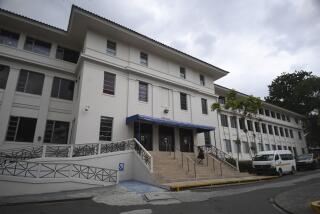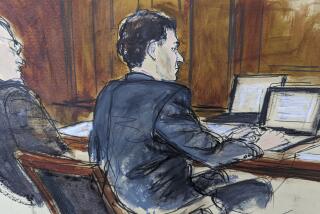Enron-Related Fraud Trial to Begin
- Share via
HOUSTON — A criminal trial scheduled to start today involving former Enron Corp. executives may shine a rare and potentially harsh spotlight on the inner workings of the investment banking business on Wall Street.
The focus of the trial in U.S. District Court is a single alleged sham transaction involving Merrill Lynch & Co. that closed almost two years before the onetime energy giant collapsed into bankruptcy.
“It’s significant because this calls into question Wall Street practices in dealing with corporate America,” said Philip Hilder, a former federal prosecutor who represents several Enron-related clients in Houston. “The ramifications of this are broader than Enron, certainly.”
The six defendants -- four former Merrill Lynch executives and two former mid-level Enron executives -- are charged with conspiracy and fraud. They are accused of helping push through a sale of several electricity- producing Nigerian barges to the brokerage firm in late December 1999 that allowed Enron to book about $12 million in pretax earnings.
Prosecutors say they knew the sale wasn’t legitimate, because Enron had secretly promised to buy back the barges, ensuring that Merrill couldn’t lose money on the transaction.
The defendants, who have pleaded not guilty, are Daniel Bayly, former chairman of investment banking for Merrill; Robert S. Furst, the former Enron relationship manager for Merrill; James A. Brown, former head of Merrill’s asset lease and finance group; William Fuhs, a former Merrill vice president who answered to Brown; Dan Boyle, a former executive on the staff of former Enron finance chief Andrew S. Fastow; and Sheila Kahanek, a former in-house Enron accountant.
Merrill Lynch avoided prosecution a year ago by acknowledging that some employees might have broken the law. The company cooperated with the government and implemented reforms to prohibit dubious deals. Six months earlier, Merrill Lynch paid the Securities and Exchange Commission $80 million to settle civil allegations involving the barge deal, without admitting to or denying wrongdoing.
A 2003 report by Neal Batson, the main examiner in Enron’s bankruptcy case, said that in December 1999 then-Enron Treasurer Jeff McMahon pitched the deal to Merrill Lynch’s Furst, who allegedly supported it in hopes of getting more business from the energy company.
Merrill Lynch’s Brown said he initially questioned whether Enron could book the deal as a sale.
Merrill Lynch’s Bayly supposedly allayed those concerns by getting assurance from Fastow of Enron’s plan to buy back the barges. Then Brown directed Fuhs to work with Boyle to close the deal, the grand jury indictment alleges.
As for Kahanek’s role, the indictment contends that she “severely reprimanded” an Enron colleague for “creating a written document,” noting the oral buyback agreement, and ordered it destroyed.
Prosecutors revealed in June that Fastow had told federal investigators that he wasn’t explicit about the buyback and didn’t use the words “guarantee” or “promise” when talking about the barge deal.
More to Read
Inside the business of entertainment
The Wide Shot brings you news, analysis and insights on everything from streaming wars to production — and what it all means for the future.
You may occasionally receive promotional content from the Los Angeles Times.










